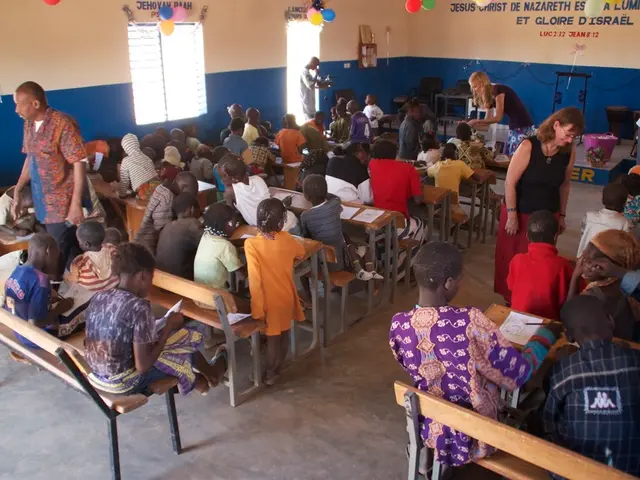Nominees for the book awards depict a "questionable authenticity"
The German Book Prize, one of the most prestigious literary awards, has unveiled its longlist for the year 2025. The list includes 20 outstanding novels selected from 229 submissions published between October 2024 and September 2025 [1][2][3].
The longlist reflects a wide spectrum of contemporary reality and narrative styles, with tales that range from classical storytelling to dystopias, historical panoramas, autobiographical and fantastical stories, and texts that use absurdity to entertain and unsettle readers [2][3].
The novels on the longlist delve into pressing social, political, and existential issues, framing them in creative and sometimes unsettling ways. The key themes and trends in these novels highlight an exploration of the precarious and fragile reality of our times, marked by uncertainty [2][3]. They also feature diverse narrative techniques such as "tapestries of speech" and "unruly lists."
The longlist includes a blend of perspectives, ranging from historical to contemporary observations and dystopian visions. It also showcases both debut authors and established voices, with six debut authors making it to the shortlist [1]. Some of the nominated novels on the longlist are:
- Lebensversicherung by Kathrin Bach
- Buch der Gesichter by Marko Dinić
- Und Federn überall by Nava Ebrahimi
- Die Holländerinnen by Dorothee Elmiger
- Die Ausweichschule by Kaleb Erdmann
- Schwebende Lasten by Annett Gröschner
- Russische Spezialitäten by Dmitrij Kapitelman
- Im Herzen der Katze by Jina Khayyer
These titles exemplify the range of voices and genres featured on the longlist [1][3].
The winner of the prize will be announced on October 13, 2025, at the Frankfurt Römer during the Frankfurter Buchmesse [2]. Last year, the award went to Martina Hefter for her novel "Hey guten Morgen, wie geht es dir?" [4].
Some of the nominated authors on the shortlist include well-known names such as Feridun Zaimoglu, Nava Ebrahimi, and Peter Wawerzinek. Ebrahimi's "Und Federn uberall" is a mix of serial storytelling and social satire centered around a chicken slaughterhouse [1]. Nandi's "Single Mom Supper Club" uses radical humor to highlight societal issues faced by single mothers [1].
Dmitrij Kapitelman's novel about the Ukraine war uses language to ridicule Putin's propaganda in a comical way. Autofictional novels remain a trend in the literature represented on the shortlist [1]. The winner of the German Book Prize receives 25,000 euros [5]. Each shortlisted author receives 2,500 euros [5].
The shortlist for the literary award will be announced on October 13, with the shortlist being released on September 16 [6]. Some authors on the shortlist have been nominated for the prize before, such as Koehlmeier, Zaimoglu, Wunnicke, Wawerzinek, Melle, Luscher, and Elmiger [1].
References:
[1] German Book Prize. (2025). Retrieved from https://www.deutscher-buchpreis.de/
[2] Frankfurt Book Fair. (2025). Retrieved from https://www.buchmesse.de/
[3] The Guardian. (2025). Retrieved from https://www.theguardian.com/books
[4] Publishers Weekly. (2024). Retrieved from https://www.publishersweekly.com/
[5] The New York Times. (2025). Retrieved from https://www.nytimes.com/books/
[6] The Bookseller. (2025). Retrieved from https://www.thebookseller.com/
Read also:
- Urban Tales: Winged Hedgehogs and Gridiron Mascots Highlight Our Legendary Series on TGC+!
- Amidst India's escalating climate crisis, transgender individuals continue to persevere
- Love, Work, and Friendship Harmonies between Aries Signs
- In New York, a previously vegan restaurant has resumed offering meat in its menu.








